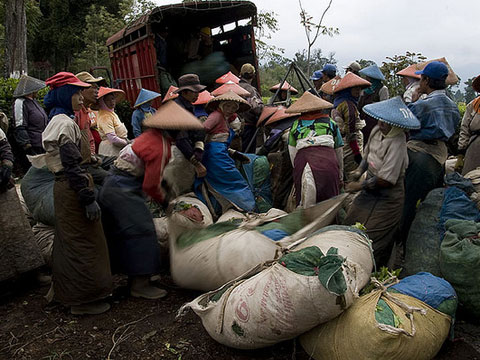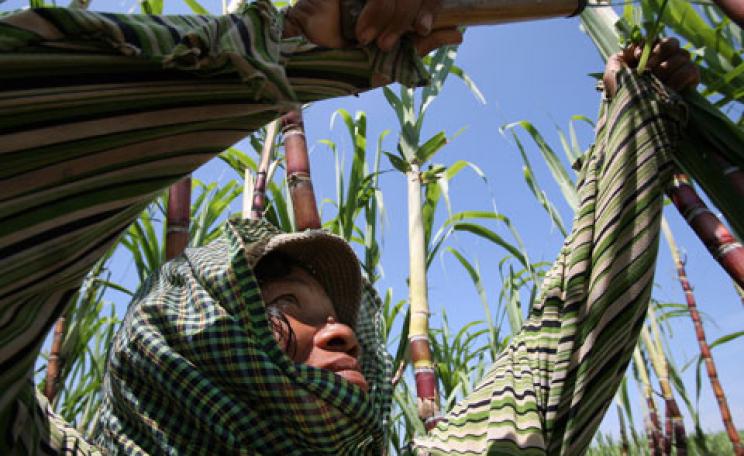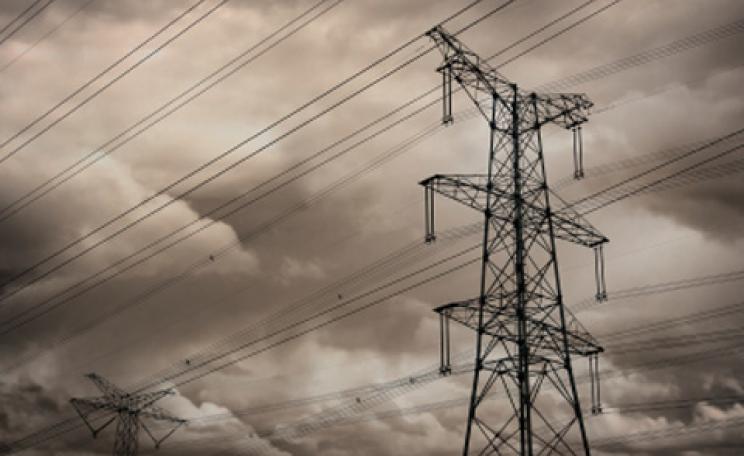Tea being loaded in Indonesia. The tea sector globally is linked to a number of human rights and ecological problems (Image: Henri Ismail)
Tea is grown in more than 45 countries worldwide, and while India and China are the biggest producers, Sri Lanka and Kenya lead the way in exporting tea to meet the global demand. Two main issues are associated with tea production: the vast amount of land required to grow it, and the intensive labour needed to harvest it. Human rights violations have been reported at plantations in virtually all major tea producing countries, while the plantations themselves have a profound effect on the local environment.
Labour conditions
Tea production, in particular the labour required for harvesting the leaves by hand, has long been associated with the poor treatment of workers. In a labour-intensive industry such as tea production, reducing the cost of labour will increase profit margins and often leads to the inhumane treatment of workers.
Plantation labourers are poorly paid. In Sri Lanka poverty levels on plantations exceed the national average, with 30 per cent living below the poverty line despite being employed. In India, where workers are expected to pick more than 20 kilograms per day, wages are as little as $1-1.5 per day. Plantation work does not give labourers sufficient wages to pull themselves out of poverty, providing the multibillion dollar tea industry with a ready supply of cheap labour.
Housing conditions are often poor and typically consist of barrack-style accommodation, where 6-11 people occupy one room, often without windows. Medical care provided on the estates is basic and there have been repeated cases of management failing to organise sufficient medical care, or emergency transport to hospital.
Women make up 75-85 per cent of the tea picking workforce and abuses of women’s rights are commonplace. In the barrack-style accommodation, women are allowed very little privacy and are at a higher risk of sexual harassment. A survey conducted on a Sri Lankan plantation discovered that this lack of privacy has led women to commit suicide. Alcohol abuse is high among males on plantations and drunken violence against women is common, according to UNICEF.
The poor treatment of workers is not limited to adults. Reports of child labour have been made on tea plantations across the globe. In 2006 more than 40,000 children worked picking tea leaves in Uganda for as little as 30 US cents a day and in 2010 90 children were found to be working in one Indonesian tea-processing factory. However, the issue of child labour is complicated by poverty-stricken parents who require their children to work to contribute towards the household income.
In recent years labour unions have been established on plantations to campaign for fair pay and working conditions, but industrial action is frequently met with brutal suppression by police and plantation owners. In 2010, on an estate owned by Tetley’s parent company, Tata Group, a worker who collapsed while spraying pesticides was reportedly refused medical treatment and later died. Protests in response to the death were quelled by local police, resulting in the deaths of two protesters and a further 15 injuries, pressure groups claim.
Land issues
Tea production has a negative impact on the environment. Natural habitats, rich in biodiversity, are converted into vast swathes of tea plant monocultures. This habitat loss leads to a reduction in the general number of species and threatens the survival of entire ecosystems.
Large areas of forest have been cleared to make way for tea plantations. In North East India, areas which used to be a combination of forest and grassland and were home to tigers and rhinos, have been converted to tea plantations. In East Africa, forests are still being cleared to make way for new plantations. Earlier this year a tract of Ethiopian rainforest was sold to grow tea, despite opposition from Ethiopia’s President and environmental authorities.
Converting forests into tea plant monocultures decreases the biodiversity of plant species, meaning many other species’ habitats are lost. Habitat loss associated with tea plantations has led to the decline of the Lion Tailed Macaque in India and the Horton Plains Slender Loris in Sri Lanka, both of which are on IUCN’s Red List of endangered species.
Tea plantations not only result in the direct loss of habitat but can impact the wider environment. Land clearance alters the natural flow of water and increases soil erosion leading to the loss of wetland habitats and the pollution of rivers and lakes. In the Tanzanian Usumbara mountains, a hotspot of unique species, streams near tea plantations have shown decreased biodiversity.
Grown in monoculture, tea plants provide ideal conditions for a number of pests, resulting in the widespread use of toxic pesticides. Recently four elephants were found dead in Kaziranga National Park, India, after they wandered into a tea plantation and ate grass which had been sprayed with pesticides. The deaths of cows and vultures in the Assam region has also been blamed on pesticides and has led to renewed calls for its use to be banned.
To meet the increasing demand for tea, more and more land is being deforested and converted into tea plantations. Cases of ‘land grabbing’ or the acquisition of land by foreign investors has been reported in many countries and several Indian tea companies have purchased in Uganda and Kenya. These acquisitions can affect local people, who lose rights to the land they depend on, and the local environment. In a recent acquisition of land in Ethiopia the Indian company Verdanta Harvests have been accused of doublespeak, manipulation and lying in order to purchase large areas of rainforest, which is home to the indigenous Mazenger people, and convert it to tea plantations.
DOWNLOAD THE FULL 'WHAT'S IN YOUR CUPPA?' SPECIAL INVESTIGATION HERE (PDF)
| READ MORE... | |
 |
NEWS ANALYSIS Special report PG Tips and Lipton tea hit by 'sexual harassment and poor conditions' Unilever and the Rainforest Alliance deny female employees at the Kericho tea plantation in Kenya are subjected to sexual harassment. But Dutch research outfit SOMO paints a very different picture of life for some working at the plantation? Verity Largo visits Kenya to investigate |
 |
NEWS ANALYSIS Special report Revealed: the bitter taste of Cambodia’s sugar boom Sugar may seem innocuous enough, but sweet-toothed Western consumers could be fuelling conflict between poor farming communities and big business with every spoonful. Sam Campbell reports from Phnom Penh |
 |
NEWS ANALYSIS Special report Milk: why the white stuff leaves a bad taste Unlike tea and sugar, the fresh milk we drink with our cuppa is likely to come from farms in the UK. But as Tom Levitt reports, there are still serious environmental and animal welfare problems associated with the UK dairy sector |
 |
NEWS ANALYSIS Special report Sugar: why our favourite sweetener is not so sweet Sugar can be produced from both sugar beet and sugarcane. Sugarcane production is of particular concern in terms of environmental degradation and human rights abuses, reports William McLennan |
 |
NEWS ANALYSIS Special report Environmental damage and human rights abuses blight global tea sector Human rights violations have been reported at plantations in virtually all major tea producing countries, while tea growing itself has a profound effect on the local environment. William McLennan reports |








